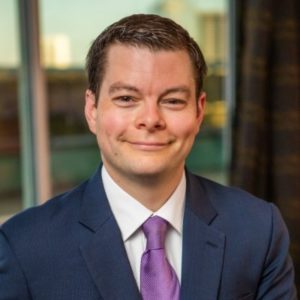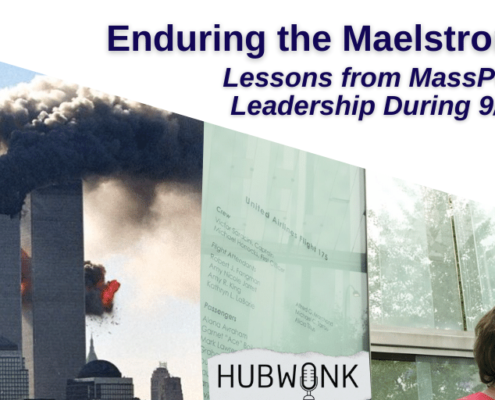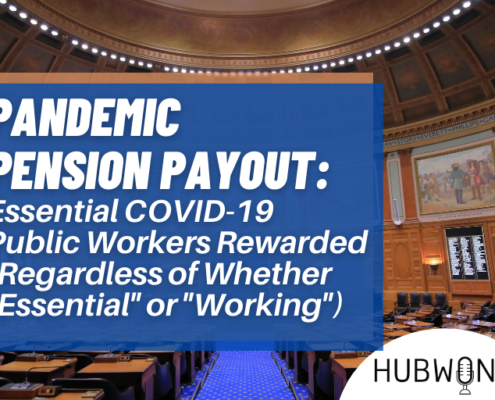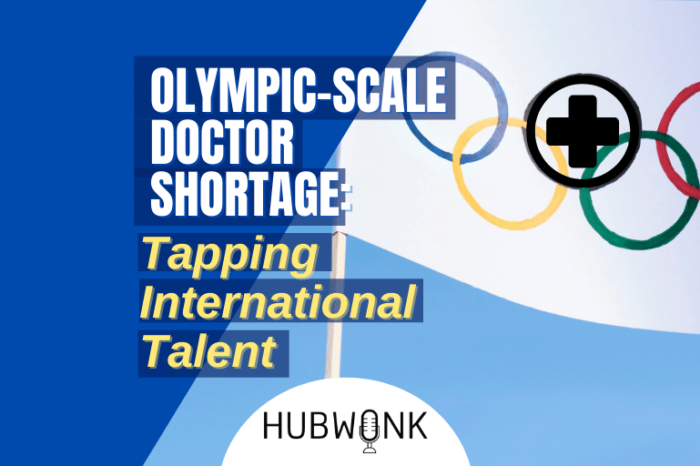Olympic-Scale Doctor Shortage: Tapping International Talent
/in Featured, Healthcare, Podcast Hubwonk /by Editorial StaffHost Joe Selvaggi talks with Pioneer Institute’s Senior Healthcare Policy Fellow Josh Archambault about the shortage of doctors in the U.S. and the potential for licensing reform to attract medical expertise from around the world to reduce future healthcare shortages and provide incentives for immigrating professionals to work in underserved communities. Read more in Forbes.
Guest:
 Josh Archambault is President and Founder of Presidents Lane Consulting. He is a Senior Fellow at both Pioneer Institute and the Cicero Institute. His work experience has ranged from work as a Senior Legislative Aide to a governor, Legislative Director for a state senator, to years working for think tanks operating in thirty-five states, and in D.C. He is a regular contributor to the influential Forbes.com blog, The Apothecary. Josh holds a master’s in public policy from Harvard University’s Kennedy School of Government and a B.A. in political studies and economics from Gordon College.
Josh Archambault is President and Founder of Presidents Lane Consulting. He is a Senior Fellow at both Pioneer Institute and the Cicero Institute. His work experience has ranged from work as a Senior Legislative Aide to a governor, Legislative Director for a state senator, to years working for think tanks operating in thirty-five states, and in D.C. He is a regular contributor to the influential Forbes.com blog, The Apothecary. Josh holds a master’s in public policy from Harvard University’s Kennedy School of Government and a B.A. in political studies and economics from Gordon College.
Get new episodes of Hubwonk in your inbox!
WATCH:
Read a Transcript of This Episode
Please excuse typos.
Joe Selvaggi:
This is Hubwonk. I’m Joe Selvaggi.
Joe Selvaggi:
Welcome to Hubwonk, a podcast of Pioneer Institute, a think tank in Boston. Americans are facing a doctor shortage. This complex problem is driven in part by the increased medical demands of an aging baby boom generation, as well as the impending retirement of doctors who are themselves in the boomer demographic. While the supply of new doctors is constrained by medical school and residency program capacity, our owner’s licensing process also serves to limit the number of foreign trained doctors, immigrating to ease the supply. Indeed, even the most accomplished medical expert in the world would likely need to repeat his or her residency were they to immigrate to the United States, given the critical and growing shortage of physicians are the reforms to our licensing process that could attract qualified doctors from around the world to help serve the needs of an aging us population. My guest today is Pioneer Institute’s senior healthcare fellow, Josh Archambault. Mr. Archambault’s recent Forbes article entitled “Olympians trust international doctors. Can they help reduce the US physician shortage?” shines a light on the barriers facing foreign trained doctors who want to practice in the United States, but who must face the requirement to repeat residency? His speech suggests that common sense reforms to our poorly designed licensing process could offer the us healthcare system much needed expertise and even provide tools for medically underserved communities to attract much needed doctors. When I return, I’ll be joined by Pioneer institute’s Josh Archambault.
Joe Selvaggi:
Okay. We’re back. I’m Joe Selvaggi. This is Hubwonk. I’m now joined by Pioneer Institute’s senior healthcare fellow, Josh Archambault. Welcome back to the show. Josh
Josh Archambault:
Joe, thanks so much for having me back again.
Joe Selvaggi:
Good. Well, Josh it’s good to have you back. I was intrigued by some of the issues you brought up. You had a, a wonderful article in Forbes just this past week. I believe maybe a week and a half ago. And it was entitled Olympians trust international doctors. Can they help reduce the us physician shortage? I’ll, I’ll paraphrase it and say it brought up an interesting idea that with the Olympics that the ceremonies are finishing up this week our athletes can compete all over the world. They have access to some of the best doctors all over the world, but doctors can’t compete all over the world. They can’t just pick up and, and go where they like. And you wove that into an idea that couldn’t, we do more to help bring these doctors here if they like and perhaps address an impending shortage of doctors. So let’s unpack your argument of the article piece by piece. Let’s talk about, I think it was some of the Olympic athletes, the winter Olympic athletes couldn’t have access to the doctors that they had wanted say more about where, where those Olympic patients are right now.
Josh Archambault:
Yeah. So my co-author Jonathan and I were like many Americans watching the Olympics off and on over the last few weeks. And one of the stories that we were noticing in some of the media coverage repeatedly was just a remarkable amount of surgeries that some of these athletes have gone through to beat, you know, especially those that are in their thirties or so, and, you know, seven knee surgeries. And then I think it speaks couple things. One, one, just the remarkable ability of modern medicine to be able to get athletes who careers would’ve been completely ruined by one of these injuries in the past, and would not have competed again to be back at the top of their game and back at multiple Olympics because of these surgeries. And one of the things that we noticed was many of them were seeking out some specialists in Europe or other parts of the world that some of these top medical professionals, and it dawned on us that actually, while Americans can go and see these, the Olympians can afford or sponsor to go and see these per providers elsewhere, they actually couldn’t provide that same label of service in America.
Josh Archambault:
And there’s a variety of reasons for that. But at the crux of it is if you went, if you’re an internationally trained physician and you want to come to the United States to practice, then you have to repeat your residency. You have to go back to what it would’ve been just after you graduated medical school. And in many cases we’ve heard repeatedly, they’re just not willing to do that for a variety of reasons. And so as we look ahead and look at the physician shortage, this raised a, a barrier and an issue, and there’s a way out of this. There are some states moving forward on it, which we can talk about, but it’s just one of those things that I don’t think most, most average patients really think about, who they can actually see is dictated by whether in where the person was trained.
Joe Selvaggi:
So you, you’re saying if you are the top doctor in the world on a particular surgery and you want to immigrate to the United States along with the attending immigration limitations, perhaps but let’s those aside for a moment you would have to go back to, despite the fact you may have been in the industry 25 years, you’d have to go back and redo your residency as if you had just graduated medical school along with your fellow 25 year olds. And, and do what is, you know, I think it’s been called residency because you essentially reside at the hospital. It’s a pretty intensive low pay retraining for someone who really is a more senior person. So you’re saying all of those doctors would have to start. I won’t say it’s square one, but let’s say not not where they left off in their, in their native country.
Josh Archambault:
That’s right. And so if we think about, you know, America aspiring to be a place of entrepreneurs and innovation, you know, I anecdotally have heard of stories of top of their field surgeons or others living in the EA for example, which they pioneer a certain kind of procedure, but I can’t come, can’t come to Boston, can’t come to New York kind, come to LA, can’t come to Kansas city, can’t come to a rural community to perform that surgery because they would have to go through that. And so I think, you know, there’s many layers to this issue that you mentioned immigration, but I think it comes down to, at the end of the day, is America wanting to be a welcoming land to this innovation, to experts in the medical field. You know, we, we look forward at the demographics in this country, especially for physicians, about 40% of physicians are due to retire by 2030.
Josh Archambault:
And so we’re just outta pure necessity. This is an issue that we need to talk about how many people are going to medical school, how many residency slots are, how, how do we fund those residency slots? Do we have enough providers in rural communities? Do we have enough of them in, under, in underserved urban communities, which is a, a major issue, but getting at just the cutting edge technology and, and medical services that don’t do emerge, do we want those entrepreneurs to feel incentivized and have a clear pathway to be able to come to the United States and practice, or even just come and teach practice here for a couple years to teach some of our medical doctors or surgeons or others to provide that. And right now there is a barrier in the way and states can do it. And what was very interesting about this as we’ve dug into this issue, and we’re not alone, Jeff Dr.
Josh Archambault:
Jeffer, who is the former Dean of Harvard medical school has dug into this as well. Is that in a lot of conversations there doesn’t actually seem to be a reason why that this requirement is on the books. It primarily is just what we’ve always done it this way. And so that really raises questions about, well, that, that doesn’t, if there’s not an actual reason for why this barriers in place, these people have already done residencies in their home country. So why would we require them to repeat it? And it’s a relatively simple change policy change, but of course the devils and the details of what, what countries are, are we allowing individuals to come? Where do we think medical programs are quote unquote equivalent going forward. But beyond those sorts of details, the actual simple concept just let’s make sure that they, they’re not taking a huge hit financially and having to live at the hospital doing 60, 70, 80 hour weeks, when really these are the folks that have 25, 30 years experience, and we wanna make sure that they have that clear pathway here.
Joe Selvaggi:
Sure. I think you, you point out a bunch of very good points in, in your remarks. I will say I don’t wanna sound like a cynic, but one of the reasons I think no one’s advocating for foreign doctors causes is they don’t vote. So they’re not here to advocate on their own behalf, but you point out to, if there’s no reason to change this, in other words, we’ve always done it this way. Why, you know, there’s no impetus to, to change your paper, your, your piece also points to the fact that there’s a projected shortage. You estimate of a, a, a shortage of physicians of 120,000 physicians by 2030. You made some reference to in your last remark to the demographics. We all know about the baby boomers retiring rate of, I think it’s a, the silver tsunami as they call it a rate of 10,000 people every day are retiring. Some of those retirees are, are doctors. So they’re going, you know, those baby boomer doctors are also retiring and will also need doctors themselves. You mentioned 40% of American physicians will be, will be retiring in that time. So why why doesn’t this make more sense? Why in a sense, looking at these inevitable demographics, why wouldn’t this be enough to really stimulate a a force for change?
Josh Archambault:
Well, I, I think we’re optimistic there, there are some states debating this as we speak Arizona, Missouri, Wisconsin, there’s bills filed there, moving on this exact issue. And I think it’s only going to grow, but let let’s peel back the onion a little bit. I think there’s a couple confounding issues that are making this worse, not only the demographics, but, you know, if you step back and say, do, do we have enough doctors or medical students coming through the pipeline to replace those that are gonna retire the answers? No we simply don’t. I, and so there is a debate to be had, and we’ve had this in Massachusetts over the years of do we have enough medical schools? Do we have enough entities training, the next generation of physicians and projections that I’ve seen from multiple organizations to simple answers? No, we do not have enough.
Josh Archambault:
We do not have enough individuals who are going into medicine able to replace this, but then the secondary issue becomes, do we actually have enough residency slots? Because that is in all 50 states for physicians and a requirement to be licensed, they have to go through the residency slot. Third answer is no, we don’t have enough residency slots. And so while we’re not graduating enough for those that we are graduating, there are still thousands of them every single year year that don’t get matched in a residency slot. Well, if you don’t get a residency slot, then you’re not able to get licensed in practice. So we’re losing them, we’re pay. They are. And we are investing all of this money to train them. And yet we do not have enough residency slots for them to go to a lot of those individuals. If they don’t get matched, maybe the second time around the second year, they will leave medicine.
Josh Archambault:
They won’t take any job in the field and they’ll go do something else. And what a loss for us as a country, what a loss for patients when access is such such an issue, then you layer onto that, that you, there is a pathway for internationally trained physicians. Once they come outta school to come, if they haven’t done a residency slot at home, they’re gonna have to apply for one of these residency slot where we do not have enough to begin with and they’re in competition. So then we end up at the, that kinda last stop of this discussion, which is what the piece is about, which is for an individual who’s already done. Let’s just say in the UK or in Canada has already completed the residency. We’re now putting them into the pool to compete for not enough slots. And it really is head scratching.
Josh Archambault:
When you start think about the way that the system has been set up. And I think that’s the crux of so many issues that we have in healthcare. There was not an original design to end up where we are now. It just evolved into what it is. And so we at times need to stop and pause and think about, okay, we’re probably not going to start from scratch in many instances here, but we can adjust and make sure that there are pathways that are common sense that are meet the needs of patient, meet the needs of physicians. And this is one of them to say that if an individual has actually already done a residency, we’re not gonna throw them into this quagmire that we have already of not having enough slots and there’s are reforms needed in Medicare. That has to do with medic with residency slots, there’s reforms needed for medical schools. Like those are whole other conversations that need to be had in this country. But at minimum, we can start with the low hanging fruit. I think you’re going to see a growing effort and focus on this because just outta pure necessity of, we need to find more sources of highly qualified providers to be able to come in to.
Joe Selvaggi:
So me to unpack what you’ve just described, you say, okay, look, we need more doctors we’ve established that, right. Particularly going forward. So we have kids going into undergrad at bio majors, premeds. We got plenty of those going in. Then they go into medical school, I suppose. They’re, you know, that funnel gets a little narrower at that point. Then they leave medical school and they need to enter one of these precious residency is, and I think your paper mentions something like 2200 medical students don’t find a, a, a program. So this seems like the limiting constraint here in the, in the process. So some who don’t go into D don’t get their residency go become, I don’t know what, what they become perhaps. I don’t know. But they they don’t become doctor. And so ultimately at the end of the pipeline, we have American born doctors.
Joe Selvaggi:
What you’re saying is if we could do some meaningful, intelligent reform on allowing international doctors to move here, practice here, and in a sense avoid needing to go back to your residency. Not only does it provide a, a poll and other words, they, they don’t have to forego income and time and become a resident again. So we have that pull, but also they’re not, they’re not crowding out American born medical students who also are competing for those residencies. In other words, it’s, it’s, win-win the doctors who are already in the pipeline, the, it, they’re not competing with these international doctors. And those of us who need here, who don’t wanna wait a long time in a waiting room have more doctors to choose from. Am I summarizing your, your points there?
Josh Archambault:
Yeah, it’s absolutely true. And, and just to be very clear, I mean, they could be American born, or they could be international students who come to American medical
Joe Selvaggi:
School. Yes. I, I didn’t mean to mean, I’m not sure, sure. I’d be native. I just, yeah,
Josh Archambault:
No, absolutely. And so it’s just, you know, medical graduates of medical institutions and, and, and what’s interesting is you have seen a number of in the Caribbean in particular, there are a couple institutions who are actually drawing quite a fewer down to the Caribbean to be trained who have very good relationships with trying to place in residency slots when they, those Americans are ready to come back to the United States. And so you’re seeing these individuals and to what, what what’s interesting is like, there are more people who want to go to med school than are able to go. So there’s actually the filtering. There’s been lots of questions about whether the narrowing is actually a beneficial thing. Are, are those not getting into medical school actually less qualified? And I’ve seen research saying, no, these are individuals that if there were slots, they would be just as good medical providers, if there were just more slots in medical school to begin with.
Josh Archambault:
So yeah, there’s certainly an issue there. I, I think the other thing that we see emerge in this debate is, well, where are these individuals going to go? Are they going to settle in urban areas or they’re going to settle in rural areas. And some of the states that are debating this reform do say that we, you can, we’re going to, you can skip the residency slot. If you go into one of the critical access that areas and you need to live there. And anecdotally what’s very interesting is on the loan repayment side, in rural American, in particular, where this is probably the most acute in some communities there’s been loan repayment programs trying to get medical students to come out, to serve well, in essence, a lot of them will come get their loan forgiven and then move somewhere else. But for a lot of these internationally trained physicians, they’ll come, they’ll bring their families, they’ll settle in the community and they’ll become deeply part of that community.
Josh Archambault:
And so that’s why you, we’re seeing a lot of rural hospitals and others excited about this sort of reform to say, Hey, we’re not just looking for somebody to come and serve for two to three years, five years, but we want somebody to come here and live here 20 or 30 years. And so while this is and I don’t wanna oversell it, this is not a silver bullet reform to the, the physician shortage issue, but it is certainly a tool in the toolbox. It seems to be very common sense, the benefits, not only the physician in their family, the hospital patients in particular. And I just think we need to make sure that we pause and how policy makers be aware of this, that with a relatively easy change, they can create this pathway for these physicians to come if they would like to.
Joe Selvaggi:
So you’re saying these programs now work deliberately to encourage or entice doctors away from, let’s say urban areas like a Boston towards more rural areas, let’s say Western part of our own state, right. Here in Massachusetts it’s probably under doctored and I would hazard guess at Boston has more doctors per square mile than any place on earth. So so you’re saying what rural communities typically do is perhaps have some loan forgiveness program to, to encourage a doctor out. What a international program I do is go directly to the international doctrine and say, if you move here you know, we, we will be supportive. And what you’re saying that even more so than the loan repayment is a stickier relationship. The international doctor who comes over and moves his family here is more likely to stay in that rural community than the counterpart from a, a us medical school, once his loans repaid, he may pack up and go back to Boston.
Josh Archambault:
Yeah. That, that, and I, haven’t seen a lots of research done on that. That’s more anecdotal from talking to people who are you know, trying to attract providers. And I, I think it doesn’t just apply to physician. I think it applies to nurse practitioners and nurses and others because you know, the shortage of medical high quality medical providers is extremely acute at this moment. Not just because of COVID, but because of a lot more mobility, I mean, it, some future episode, Joe, we can talk about the nurse shortage issue that is out there and the amount of hospitals and others that are using traveling nurses, individuals who only come in for three months or six months, and then move on. I mean, having a culture of care at the highest quality when you have your staff turning over every three to six months of individuals moving, not to say that these are not good providers, but just difficult when you’re having new personalities come in, having to, to learn new systems.
Josh Archambault:
So if you’re able to get providers, whether it’s a physician, not way down to a nurse, who’s there and is living in the community and not going to move on in three to six months, that is by far the preference going forward. And we’re having an unprecedented amount of disruption happen in our, a lot of medical settings, both urban and rural. And so we have to look at some of these alternative ways to make sure that individuals that wanna come and if even 50% of them settle down in their community and become really valuable parts of that community, that’s a huge win. And, you know, I think the last thing I would just say here, Joe, about the numbers of what we’re talking about is this has been a little bit of a chicken and an egg debate of trying to understand will a lot more physicians come.
Josh Archambault:
If they know that they have to go through the residency slots there is a visa program that allows individuals to come currently right now and not all of those visa slots are taken every year. And the speculation for years has been beats because of this barrier. And so I think interestingly, if a few states pass this, we’re gonna find out in the next five years or so, whether that is in fact, the primary area for these trained physicians to come, or whether it’s other issues they don’t know about the opportunity. They’re not being recruited. Maybe it’s the systems are just different between some of these countries, but when you’re talking about Israel, Australia, the UK, Canada, Ireland, but these systems are close enough. In many people, we have seen individuals come into the country out of these countries and do a fellowship, be here for 10 years and maybe go back home due to family reasons. It, it is not that big of a stretch to see that you would see more flow back and forth of physicians coming and actually becoming and settling down.
Joe Selvaggi:
Well, I like to say often when we’re talking about topics here on hub long, I say our audience are not just they’re not into just merely our ideas or think tank, but we’re also a do tank. You, as you say, there’s many layers to this question but medical staff stability. But to in the wake of the disruption of COVID is something that benefits all of us. Of course, the doctors and the nurses wanna be stable. The patients themselves wanna see the same familiar face when they are, when they’re sick. What can listeners and I, I really wanna address more of the state level. Of course immigration can be more of a national issue, but let’s address what we could do as a state. If policy makers are listening to this show and this strikes a chord with them, what, what could we do?
Josh Archambault:
Yeah, I think there’s probably two pathways here. You know, first is the legislature of the general court, certainly could pass a law model of one of the other bills that have been filed around the country that creates an explicit pathway. And those bills typically have done a few things. The one, the first one is they’ve actually named a number of countries. And to say, we are gonna have some sort of reciprocity here that if you have attended a medical school, and there is entities international entities who certify these schools. And so if you attend one of these schools in one of these countries that are recognized, then if you would like to come and practice in the United States, you still need to meet every other requirement that the board of licensure has, but you do not need to repeat your, the residency as we’ve been speaking about that at least brings clarity that allows medical institutions, hospitals, to know that they can go out and recruit at these international program and say, or other facilities and say, you know, we really would like to have you come and practice at our hospital because of the high quality work that you are doing and let people know here’s the process to do that.
Josh Archambault:
You no longer have this multi-year barrier in place. So it’s that simple. I do think that in many cases, including Massachusetts, the boards themselves could be a lot more explicit. I think this is an education gap, more than anything. It’s just to say, this is something that you can do to set up a process in which individuals to say, here are the criteria that we are looking for. You need to be in good standing back home. You need to have gone to one of these schools. You need to have not had major liability issues in the last few you years going forward, we need to see your records. We need to see how you did in school. It, you completed school, all of those kind of basic things that we would want to double check before somebody comes, but it’s often the gray area here that leads to, I think, hesitation for people going forward so that states could very easily pass a law. Or I think the boards could really clearly articulate out to say, this is the pathway that we’re going to have going forward, and we’re gonna welcome open the door to these individuals that wanna come practice.
Joe Selvaggi:
But a wonderfully interesting experiment will be if we can get this all going. I think to myself as a, as a city guy myself we see a lot of immigrants all the time. Usually the urban center is where immigrants start. Certainly my grandparents, that’s how they went. I can imagine seeding our rural communities with very well educated people from other places. It may, may change our our culture, right? We, the people pillars are our community are our, our medical professionals coming from elsewhere. May, may change our sort of a notion of what people from other places look like are like it may, I think have a very beneficial effect on just our, our our view of the world. If, if the person curing your kid or your mom is from somewhere else it may have, have a, take a different look on, on the rest of the world. I’m, I’m just offering that as an aside, as a, as a, a thoughtful idea. This has been very informative. Is there anybody taking lead up on our state house in our state house on beacon hill, someone a Crusader for, for the cause of international medical doctors. I met asking you this, not knowing if you do have an answer, I I’ll just throw that out there
Josh Archambault:
To date. There is not I think that this is an open opportunity for the conversation to start in Massachusetts.
Joe Selvaggi:
Oh, good. All right, we’ll leave it there then, then thank you very much, Josh. That it was a great great article in, in Forbes. Congratulations on getting it in there and thanks for helping make this, you know, this somewhat our Keene piece of information more familiar to our listeners. I, I think this could not gonna solve the problem, but we, we are moving towards finding a solution. So thank you very much. Thank you.
Joe Selvaggi:
This has been another episode of Hubwonk, a podcast of Pioneer Institute. If you enjoyed today’s episode, there are several ways to support the show. It would be easier for you and better for us. If you subscribe to Hubwonk on your iTunes podcast, catcher, if you’d like to help make it easier for others to find Hubwonk, it would be great if you offer a five-star rating or a favorable review, we’re always grateful. If you share Hubwonk with friends, if you have ideas or suggestions or comments for me about our episodes, you’re welcome to email me at Hubwonk@pioneerinstitute.org. Please join me next week for a new episode of Hubwonk.
Recent Episodes:

Enduring the Maelstrom: Lessons from MassPort Leadership During 9/11

Rescuing Afghan Refugees: Finding Redemption amidst the Wreckage of Collapse

Untangling Variants & Outbreaks: Can Vaccines & Natural Immunity Outrun Delta?

Targeting Pharma: Infrastructure Bill Employs Price Controls To Offset Unprecedented Price Tag

Examining Eviction Moratoriums: Testing Constitutional Limits of Executive Branch Power

Pandemic Pension Payout: Essential COVID-19 Public Workers Rewarded Whether Essential or Working

College Debt Explained: Education Pays When Students Choose Wisely




